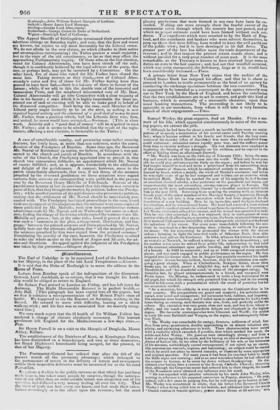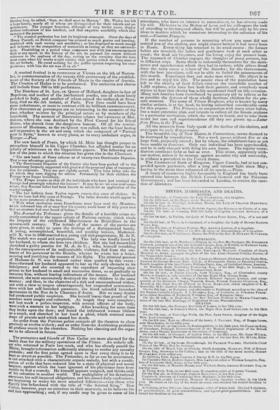Samuel Wesley, the great organist, died on Monday. From a
me- moir of his life, which appeared simultaneously in most of the morn- ing papers, we extract the pith.
" Although he had been for about a month sn invalid, there were no anti. tuitions of so speedy a termination of his mortal career until 'Tuesday morninF last ; when it became evident to his family and friends, that the long cents. nuance of his disorder (that of diarrhata) was more than his enfeebled frame could withstand : exhausted nature rapidly gave way, and the sufferer passed from time to eternity without a struggle. His last moments were employed ia imploring the blessing of the Almighty on his children, and he expired in the effort of bidding them an affectionate farewell. " Mr. Wesley was born on the '24th day of February 1766 ; being the same day and month on which Handel came into the world. When only three year' old, he could play and extemporize freely on the organ ; and before he was five had taught himself to read and write a print-hand from his unremitting study of the oratorio of Samson, which he cemmitted entirely to memory. He also learned by heart, within a mouth, the whole of Handers overtures; and before he was eight years of age he hail composed and written out an oratorio, which he entitled _Huth. Before he reached the year of his majority he had become an excellent classical scholar, a fine performer on the pianoforte awl organ, and unquestionably the most astonishing extemperaneous player in Europe. Hit t
prospects in life were unfortunately clouded by a dreadful accident which befe him in the year 1787. Returning from sm tiling the evening with an intimate fi ieud, (one of the oldest members of the Mteirigal Society,) in passing through Snow Hill, he fell into a deep excavation which had been prepared for the foundation of a new building. Here he las. insensible, until daylight disclosed
his situation, and he was conveyed home. head had received it most serious injiti y, and the medical attendants wished to perform the operation of trepanning; but Wesley obstinately refused his consent, and the wound was permitted to heal. This he ever after tegretted ; for, it is supposed, that in consequence of some portion of the skull Alter ing to, or pressing upon, the brain, originated those petite Meal states of high nervous irritability which subsequently checked and darkened the splendour it his career. For seven years immediately following his acci. dent, lie relnained in a law desponding state, refusing to cultivate his genius for music. On his recovering, he prosecuted the science with the utmost ardout ; bringing to light the immortal works of Sebastian Bach, then alike unknown here and on the Continent. In 1813, when on hie journey to conduct an oratorio at Norwich, he suffered a relapse of his mental despondency; and for another seven years he retired from public life, endeavouring to find relief in the constant attendance upon public worship, and living with the austerity of a hermit. Iu 1823 he recovered ; and up to 1830 composed many excellent pieces, and was much engaged in public performance on the organ. He thee relapsed into his furtner state, but in August last partially recovered his health and spirits: it soon became evident, however, that his constitution was under. going a great change. When at Christchurch, Newgate Street, about three weeks ago, he rallied, passed a delightful day, and spoke in the evening of 31endelssohn and ' his wouderful mind,' in terms of the strongest eulogy. On Saturday last, he played extemporaneously to a friend, and composed some Psalm tunes. On Monday, he endeavoured to write a long testimonial for AI old pupil, but is bleb his strength only permitted him to sign, and in the evening retired to his room with a presentiment which the event of yesterday has but too accurately verified.
"As a musician, his celebrity is even greater on the Continent than in his
own country. His compositions are grand and masterly ; his melodies sweet, varied, ever novel and unexpected ; Isis harmonies hold, sublime, and imposing. His resources were boundless; and if called upon to extemporize for half-a dozen tunes during an evening, each fantasia was new, fresh, and perfectly unlike the others. His execution was very great, close and neat, and free from labour or effort ; and his touch on the pianoforte delicate and chantunte in the highest degree. His favourite contemporaries were Clementi and Woelfl ; his models in early life were Battishill and Worgan. on the organ; and subsequently Sebas- tian Bach.
" Mr. Wesley was remarkable for energy, firmness, nobleness of mind, free.
dom from envy, penetration, docility approaching to an almost infantine sim- plicity, and unvarying adherence to truth. These characteristics were united with a credulity which exceeded, if possible, that which marked his uncle, the celebrated John Wesley. His passions were exceedingly strong ; aud from a habit of always speaking his miud, and his having no idea of management or the finesse of human life, lie too often by the brilliancy of his wit, or the bitterness of his sarcasm, unthinkingly caused estrangement, if not raised up an enemy. this conversation was rich, copious, and fascinating; no subject could be started which he could not adorn by shrewd remarks, or illustrate by sonic appropriate and original anecdote. For many year. it had been his constant habit to study the Bible night and morning; and as no meal was taken before he had offered op his orisons to heaven, so he never lay down without thanksgiving. He dis- claimed ever having been a convert to the Roman Cstholic Church ; observing that, although the Gregorian music had seduced him to their chapels, the tenets of the Roinanists never obtained any influence over his mind. " Ile was regarded with peculiar solicitude by his uncle John Wesley, who; writing in refetence to his supposed conversion to Popery, observes, Ile may, indeed, roll a few years in purging fire, but he will surely go to heaven at last.' Mr. Wesley was accustomed to relate, that his father (the Reverend Charles Wesley) when dying called him to his bedside, arid addressed him in the words ' Ceuta& %wakes et vexatio spiritus; pruner mare Deum et illi servire; ' ands blessing him, he added, ' Sam, we shall meet in Heaven.' Mr. Wesley has left a large family, nearly all of whom are distinguished for their talents and ac- quirements. The younger branches, although of very tender years, display evident indications of fine intellect, and that exquisite sensibility which cha- racterized the parent. " The musical profession has lost its brightest ornament. Since the days of Henry Purcell, no British composer has evinced so much genius and learning, combined with such variety and sensibility; or has displayed so much energy and industry in the composition of memorials as lasting as they are extraordi- nary. Flourishing at a period when composers met with less encouragement
i than at any epoch n the history of the art, he pursued his course without reference to the applause of the day, resting on the certainty that the time must come when his works would receive that justice which the then state of the art forbade. He cared nothing for the public opinion respecting his corn. positions; with him the art was all in all."



























 Previous page
Previous page